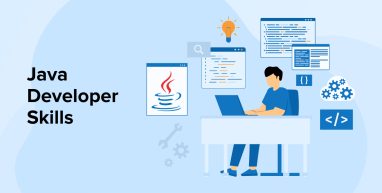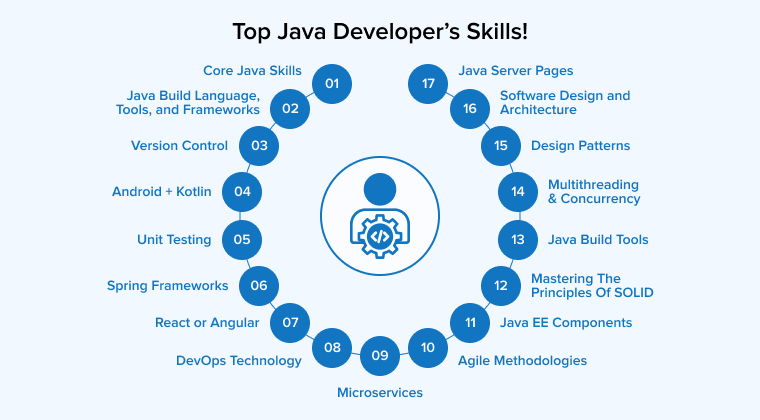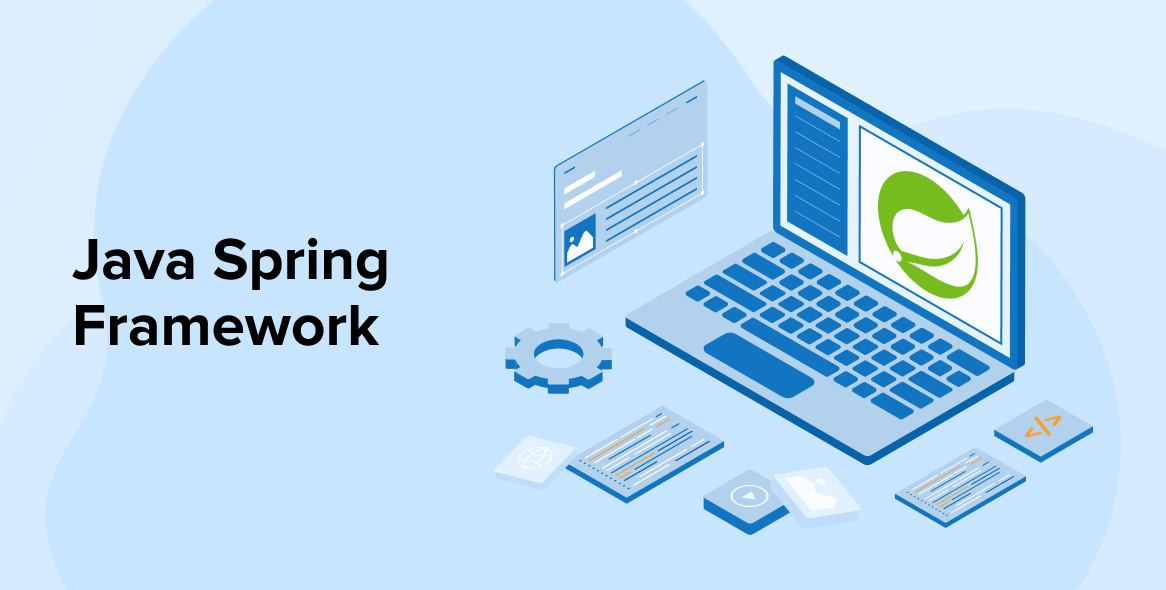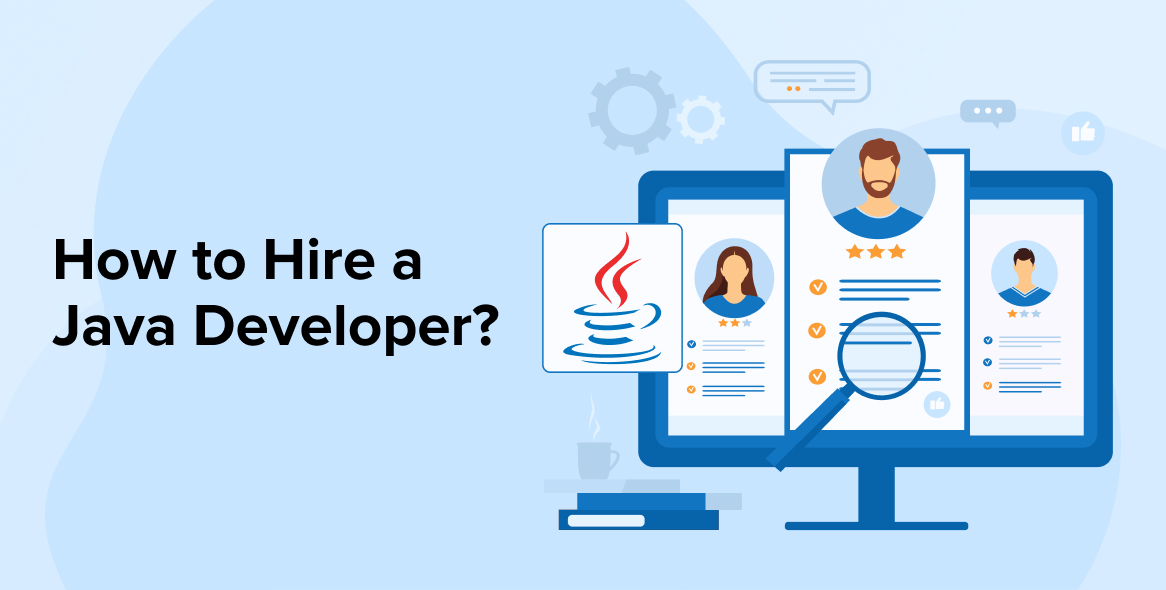
Java is also continuously evolving and it has been fifteen fruitful years that we have seen the Java programming language progressing and advancing at an unprecedented speed and has become one of the most popular programming languages. In research by Statista, it has been proved that Java ranks among the top 5 programming languages and has been helping enterprises to accomplish their business goals. Equally, there are many companies looking to hire Java developers, on the other side, there are many java developers already grooming themselves with the latest technology skills. On the other hand, a leading java development company like TatvaSoft excels in developing cutting-edge Java applications.
In our new blog post, we’ll make you go through the top java skills that every Java developer must have for fulfilling business needs.
1. Who is a Java Developer?
A Java developer refers to a professional in the field of computer software programming who masters and incorporates the Java programming language for the purpose of creating computer programs, web development, and fulfilling various client and server-side demands.
The responsibility of a Java developer includes the design, development, and maintenance of applications that are based on the Java programming language. Due to its extensive use, particularly within major organizations, the daily tasks associated with Java programming exhibit a certain degree of variability. These duties may encompass the ownership of a specific software application or engagement in the simultaneous development of many programs.
A Java developer usually works in an organization’s information technology department. Your company’s structure will determine whether you have a centralized IT department or many, more specialized IT teams handling different tasks.
2. Top Java Developer’s Skills!
The potential of Java has been the talk of many companies. The fact that Java has been in use in almost every company, whether they be small companies or big tech giant companies like Google, Amazon, etc. On the other hand, there are many other companies that are looking to hire a Java developer for their business. But not many know how to hire. Java Developer Skills can be divided into two categories i.e technical and soft skills. Let us start with the must-have basic skills of a Java developer.

2.1 Core Java Skills
The basic needs of Java mean the basic understanding of how Java works. Core Java skills are the building blocks of every successful Java developer. What are the frameworks involved and what type of tools are used and finally what exactly does a Java programmer do? It may quite interest you to know that any business can leverage the benefits of outsourcing Java services. All they require to do is choose the right team of Java developers with efficient java skills.
Java is a versatile, resilient, and all-rounding development language that helps to create a wide range of software, including desktop, dynamic web content and web applications, cloud services, and mobile apps. Along with Python, Java’s capabilities extend to Big Data applications.
Consider the following Java technologies if you wish to excel as a Java developer:
- Java is an Object-Oriented Programming language, it follows object-oriented programming (OOP) principles and uses Object Oriented Methodology which makes it easier to maintain and debug java code.
- MySQL, PostgreSQL, and MariaDB are relational databases. Writing using MySQL queries.
- Git and BitBucket are two popular version control systems.
- Using IntelliJ IDEA as an integrated development environment (IDE).
- HTML, CSS, and JQuery are examples of web frontend technologies for designing web pages.
2.2 Java Build Language and Frameworks
When you are completely drowning in Java, there are a few things that your developers must know about Java. In Java there is Java SE and Java EE (i.e advanced java), these are the two types of framework where your java developer needs to have expertise. Also, there are other tools such as Servlets, Java Beans(EJB), Java Server Pages(JSP), and technology frameworks that are making a difference. Like Spring frameworks such as Spring Boot, Spring MVC, and Spring Cloud for developing web applications. And there is Hibernate framework too which is another popular framework used for projects that also help you establish popular domain java frameworks. Other than these frameworks, tour businesses should also understand about:
- JavaServer pages (JSP) and servlets.
- Web frameworks (e.g., Struts and Spring).
- Service-oriented architecture/web services (SOAP/REST).
- Web technologies like HTML, CSS, JavaScript, and JQuery.
- Markup languages like XML and JSON.
- Object-oriented programming concepts and design patterns.
- Java Web Frameworks like SpringMVC, Play, Java Server Faces.
- Java Build Tools like Maven and Gradle.
- Java EE Components like Servlets, Java Beans(EJB), and JavaServer Pages APIs provide methods for logging through the use of cookies on a user’s browser.
- Java Testing Tools like JUnit, TestNG, and Selenium allow you to test your JSP pages and Web Application.
- Java Application Containers like JBoss, Jetty, WebSphere, WebLogic.
With all the basic understanding and features, we now know what Java- as a popular programming language is capable to offer. It is ideally fit for all types of development platforms. Enterprise can also use Java for cross-platform app development and customized enterprise solutions. In the next section, we will see what version control is with Java.

2.3 Version Control
Although you might have developed something fantastic, but wouldn’t suffice for current market trends then the agenda of development is failed. Having code version control as an ability would allow you to keep track of and control any modifications to your source code, ensuring that the original code is not harmed. Also, in the process of developing if something went wrong along the way and you had to start again.
The version control here is important for a Java developer to be aware of all technology changes occurring in each technology and check what makes a difference and how. As each version would demand to enhance its basic Java skills and knowledge to imply it in the current web or mobile application.
2.4 Android + Kotlin
Often when you develop applications for the Android or iOS platform, It is equally essential for skilled Java developers to have the skills required for the app development process. The required skills will help web and software developers in the web development and software development process and help deploy web applications successfully on the world wide web. And in favor, it will help developers to create smartphone applications. Knowing how to build Android apps in Kotlin would make you stand out from the crowd.
In reality, the Android platform is gradually migrating to Kotlin, a modified Java language. Hence a good Java developer must have expertise in both Android and Kotlin to understand the engineering of the developing application.
2.5 Unit Testing
This is an area where there is a lot to learn. If you devote some time to improving your unit testing skills, then not only will your coding skills improve, but you will also become a more professional software developer, which is something that every employer seeks.
Unit testing has numerous Mockito and PowerMock for mocking objects, Robot Framework and Cucumber for automated integration tests, and of course, the new and dazzling JUnit 5 library are just a few of the new frameworks and unit testing tools available for Java programmers to unit test and integration test their applications.
2.6 Spring Frameworks
Spring Framework is one of the popular names in Java development technology. There are researchers who say that more than 2000 websites are built using the Spring framework. You basically generate objects of the classes, call the methods, and get the desired result when you use a library.
Spring makes an effort to avoid close connectivity (when classes explicitly focus on other classes and interfaces in the framework) by relying on annotations. It is currently built on the Model-View-Controller (MVC) architecture, which divides processes, sectors, and representations. Spring is popular among developers because of its excellent object injection capability, elegant syntax, accessibility, automation testing tools such as Junit 5, and low entry barrier that works well for new developers of Java.
2.7 React or Angular
As a Java developer, there can be diversified needs and businesses have to fulfill those. React and Angular development technology is one such type of need that makes your Java-developed application better. These two Javascript frameworks have completely changed the face of technology. They have brought into effect newer ways in 2021 and will definitely enhance Java development and command as a programming language.
2.8 DevOps Technology
As more companies move toward DevOps and implement continuous integration and deployment, this is one area where there is a lot of traction. DevOps is large, and you’ll need to master a lot of tools and techniques, which can be overwhelming for some engineers. Here are some of the reasons together with DevOps.
Continuous integration (CI), continuous deployment (CD), and Jenkins’ position in all phases are all important concepts for a competent java developer to understand. You can use it to learn and master DevOps on your own time. There are experienced and successful Java developers who understand the technology in depth simultaneously and imply it within their business. Development and operations go hand in hand in DevOps. It will automate the overall process, and structure and you can become a DevOps engineer. Let’s explore some of the DevOps tools that a java developer requires!
1. QuerySurge
QuerySurge is the intelligent data testing solution that is one of the first inventions and a full DevOps solution for constant data testing.
Essential Features:
- Robust Web APIs with over 60 calls.
- Completely combines into the DevOps pipeline for constant testing.
- Documents large volumes of data quickly.
2. Basis Technologies
Basis Technologies gives the only DevOps and test automation program engineered especially for SAP.
Essential features:
- Automate 90% of the hand-operated effort.
- Single BackOut use rolls back deployments.
- A completely customizable approval method.
3. Katalon TestOps
Katalon TestOps is a strong orchestration program that services DevOps conversation and collaboration flow.
Essential Features:
- Design efficiently with Smart Scheduling.
- The modernized result set across any framework.
- Real-time data tracking.
- Customizable warnings.
4. Embold
Retaliating bugs before deployment preserves a lot of time and power for further procedures.
Essential Features:
- Amazing anti-pattern detection.
- Unite completely with Github, Bitbucket, and Azure.
- Get more profound and durable.
2.9 Microservices
Microservices is a new addition to this list. It is a RESTful web server extension, this is integrated into the application with the goal of breaking up your code into a lightweight, dispersed, and autonomous application. This allows easier creation, deployment, and management of new features with security.
With its emphasis on elastic scaling and on-demand infrastructure, the Microservices model is perfect for the public cloud. It does, however, necessitate careful planning and extensive preparation. The spring-based tools support the job of microservices by enabling simpler extraction from cloud-based applications. The features get more enhanced and improved.
2.10 Agile Methodologies
Working efficiently in an Agile setting, such as Scrum or Kanban, is crucial for every Java developer.
As the specifics might change depending on your organization’s favored Agile technique, you’ll likely learn these abilities as you progress through your development career.
Overall, an Agile team member is someone who is good at setting priorities, working well with people, prioritizing duties, developing clean code rapidly, testing that code extensively, and engaging interactively with stakeholders to make sure the final product is what they want.
2.11 Java EE Components
Developers can generate server-side apps with the help of Java EE Components. Industrial developers often struggle with how to respond to queries from web-based customers. Java EE’s Servlet and JavaServer Pages APIs offer a simple and effective approach to this problem by making it possible to record user actions via the browser’s cookies. Servlets, Java Beans, and Java Server Pages are three of the most important parts of Java EE.
2.12 Mastering The Principles Of SOLID
The initials of SOLID refer to the following:
The letter “S” represents “single responsibility.” Its key idea is that a class should have only one responsibility. The subsystems that execute the solutions to many problems that a class is accountable for become intertwined.
“O” denotes the “Open-Closed” concept. Classes, modules, and functions should be able to grow in functionality but not change.
L talks about the Subclasses that should be able to assume the roles of their superclasses, as stated by the Liskov Substitution Principle.
“I” stands for the Interface Segregation Principle. Build client-specific interfaces from the ground up. Customers should not have to rely on interfaces they have never used before.
The letter “D” represents the Inversion of Dependency Inversion Principle. The dependent object ought to be a theoretical construct rather than an actual one. Higher-level modules shouldn’t rely on lower-level ones. Abstractions are useless without attention to detail.
The purpose of these five guidelines is to make programs more reliable and easier to update. A competent programmer should be able to draw on these ideas as required.
2.13 Java Build Tools
Developers are obligated to make use of specialized software for each task they are given. As Java Build tools are the software that automates the generation of functional applications from source code, it is helpful for a Java Developer to be familiar with the vocabulary of Build tools in Java. Maven and Gradle are examples of essential build tools.
2.14 Multithreading & Concurrency
When many threads can run simultaneously, we say that we are multitasking. Concurrency is the capacity to execute numerous tasks in parallel or in sequence while still making forward progress.
Consider the scenario in which you wish to become proficient in the tools and techniques used by Java developers. These are critical because they let you build multitasking apps, which are necessary for processing enormous datasets or lots of work.
2.15 Design Patterns
Software development challenges are everywhere, yet design patterns provide reusable answers.
Being familiar with various design patterns as a Java developer can aid in problem identification and the selection of appropriate solutions. Design patterns such as Singleton, Observer, and Factory are frequently used.
2.16 Software Design and Architecture
Designing software involves thinking about how it will respond to input from users, external interface stimuli, and other components of the computer’s physical and virtual environments. The user’s ability to provide commands and get responses will be factored into software development. It’s a way of formalizing user needs so they may be used as a roadmap for the developer or coder.
All the parts and how they work together and respond would be described by the architecture. Corporate planning, social dynamics, and the IT infrastructure are all crucial components of any software’s architecture. Therefore, it is simple to define architecture as the plan for a system. It provides methods for controlling the system’s complexities and coordinating cooperation among its parts. Layered patterns, Client-Server patterns, Event-driven patterns, Microkernel patterns, and Microservices patterns are some of the most prevalent software architectural patterns.
2.17 Java Server Pages
As a server-based technology, it operates behind the scenes. Web applications and dynamic web content can be developed with Java server pages. To do this, Java Server Pages (JSP) elements are used to include Java in HTML documents. Using this web-based technology, you may make websites that are both interactive and self-sufficient. Its functions are browser- and server-independent, making it portable, flexible, and simple to maintain. Because of this function, a fresh compilation is not required. Using tags like action or custom tags shortens the code, which means less time is spent writing it and more time is spent actually making the application.
3. How to Become a Java Developer?

A Java developer is a software developer who possesses expertise in the configuration, trial, and implementation of software utilizing the Java programming language.
Though the name is alike, Java should never be mixed with JavaScript, a precisely distinct object-oriented programming language. Java is practiced in most companies, from small companies to big tech companies such as Google, Amazon, etc.
So, being a Java Developer in today’s digital era can heighten your career very thoroughly! And that is why here we have pointed out some of the essential points to becoming a successful Java developer. But the first step demands the successful completion of a Computer Science qualification.
3.1 Learn the Core Java SE
Begin with Core Java(Java SE) and comprehend it thoroughly. You need to acknowledge and learn basic theories such as loops, arrays, operators, and others.
Moreover, Java SE has a variety of general-purpose APIs such as java.lang, java.io, java.math, etc. and you need to have theoretical information about them at least. You should also commence studying OOP’s notions as they are famous in Java.
3.2 Keep Practicing Java
Whatever you study in Core Java, just keep studying it so you can formulate the configurations without any primary mistakes.
Moreover, it is simple to implement a solution to a difficulty in theory but the difficulty lies in effectively completing the strategy as you will learn the language barriers and best design systems.
So grasp coding and practice Java and also attempt to perform mini-plans at whatever point you learn.
3.3 Study Java EE
One can begin studying Java EE(Enterprise Edition) which is also recognized as Advanced Java after completing core Java. When you commence studying Java EE components developers can manage web development as Java EE has stipulations for extra features like dispersed computing and web services.
This involves technologies such as Servlet, WebSocket, Java Server Faces, etc. concerning web terms.
3.4 Create Projects With Servlets and JSP
Whatever you see in Java EE just mix it with Front End technologies like HTML, CSS, and Javascript, and work to perform mini projects on particular topics as it will clear your mind.
Moreover, you must make at least two designs, first starting with Servlet and then following with JSP. This is because without performing projects on these you will never be more certain about how much you understand this programming language.
3.5 Study Hibernate and Spring Frameworks
When you finish both Java SE and Java EE then you should study Java Web Frameworks which add the Hibernate Framework and Spring Framework. These are the most general frameworks of Java.
Most Java Development Companies these ages practice Spring frameworks like Spring Boot, Spring MVC, and Spring Cloud for producing web applications, etc.
Hibernate framework is also very common for planning a domain object-oriented design to a relational database and the Hibernate Query Language.
4. Wrapping Up
Java is a valuable skill to master, and the best thing is that the internet provides some of the best tools for learning Java, from the fundamentals to advanced programming. The learning from the Java development process will boost the overall performance of the application. We can address all the requirements and fulfill them with Java. These are some of the inevitable java developer key skills that one must use when one wants to become a Java developer or your business needs to hire Java developers. Together we can build sturdy and high-quality Java apps that accelerate productivity and help businesses grow.
FAQ
What Skills Do Java Developers Need?
Java developers require a wide variety of skills, from a comprehensive understanding of the core concepts to an in-depth grasp of the most recent innovations. It is also expected of Java experts to understand how the code is developed and switch between different environments.
What Does a Java Developer Do?
Ans: A Java Developer refers to a professional in the field of computer software programming who masters and incorporates the Java Programming Language for the purpose of creating computer programs, web development, and fulfilling various client and server-side demands.






This blog was a goldmine for me as a Java developer! It sheds light on the essential skills needed to truly bridge the gap between technical expertise and business requirements. I'm definitely sharing it with my colleagues.
This blog post is an invaluable resource for anyone looking to hire skilled Java developers. It provides a clear roadmap by highlighting essential skills like core Java, build tools, frameworks, and Agile methodologies. Keep Sharing!